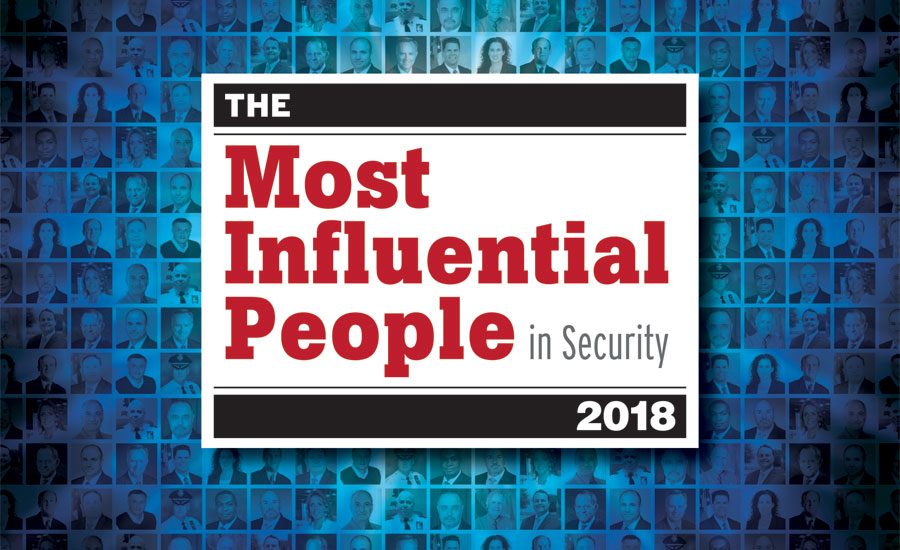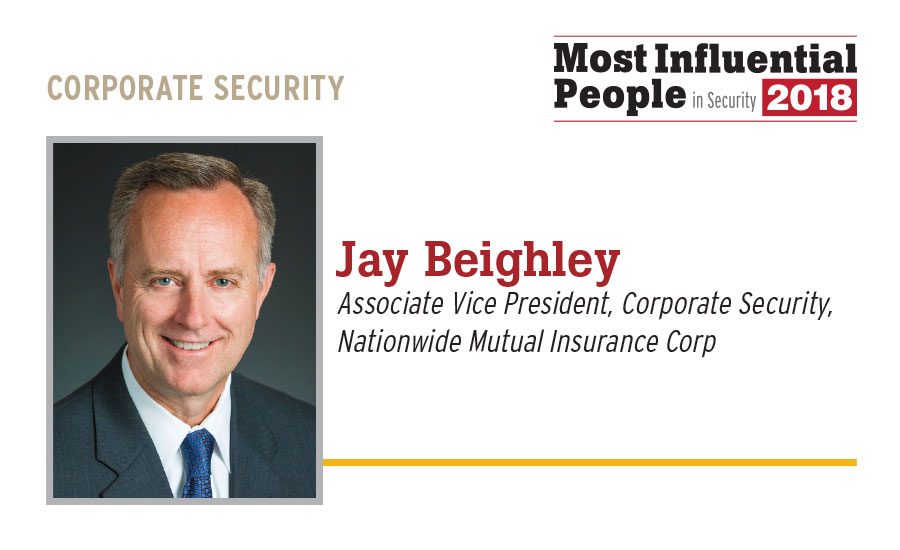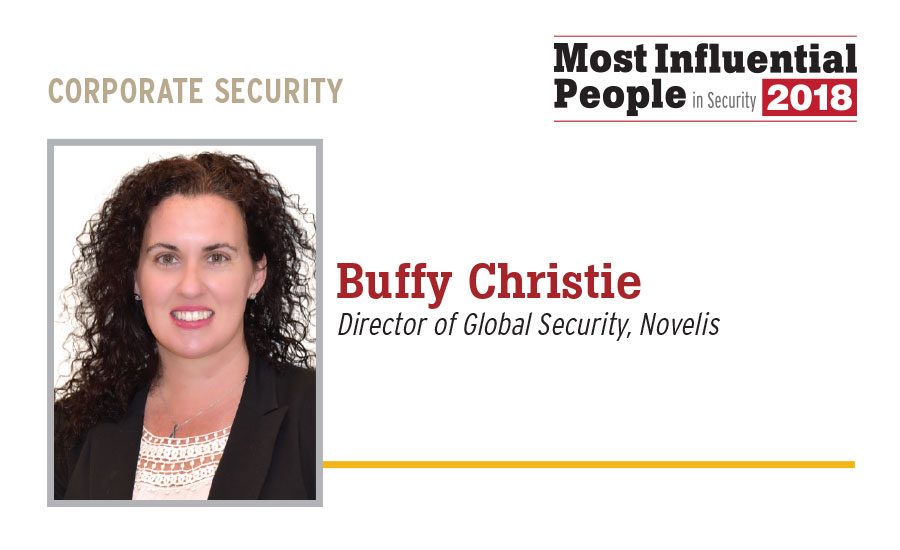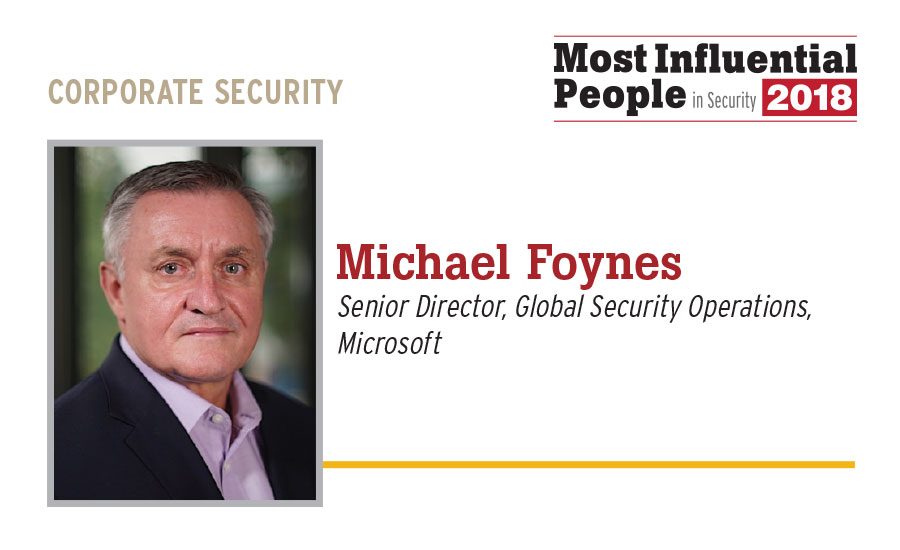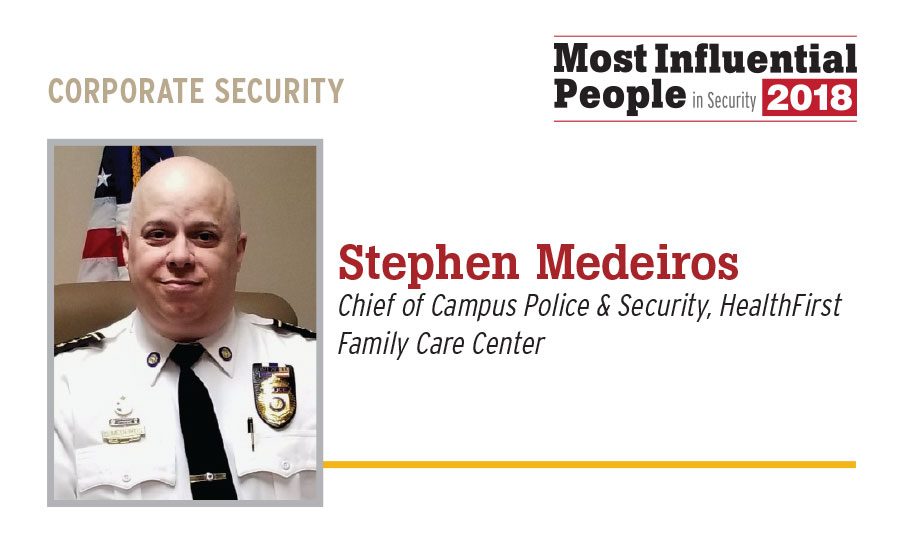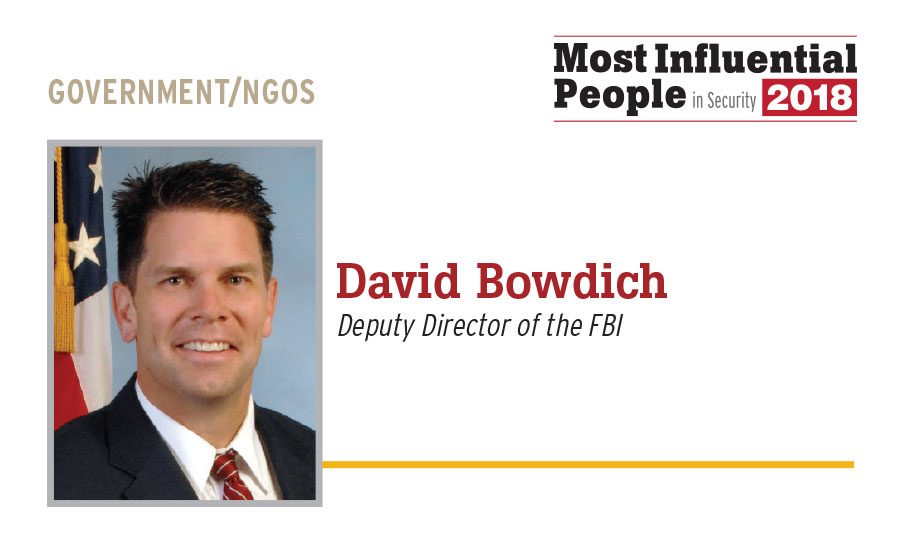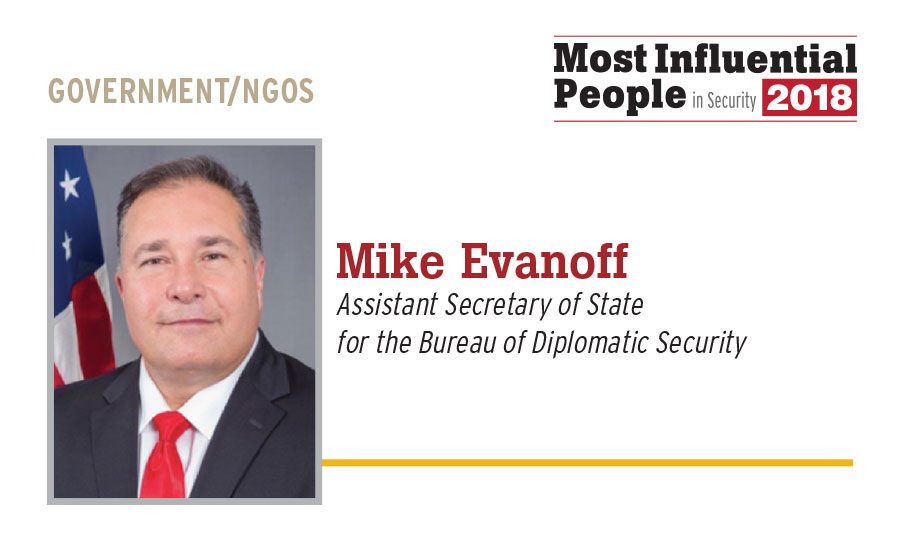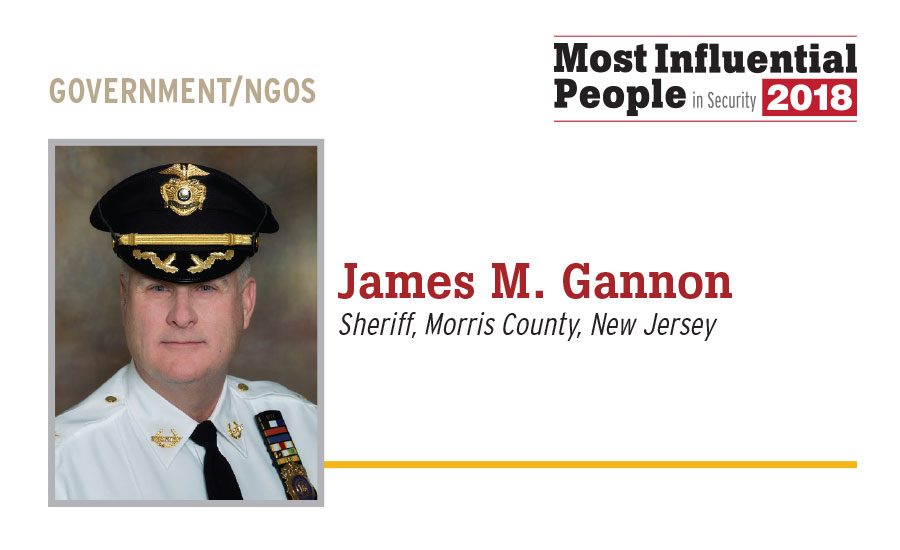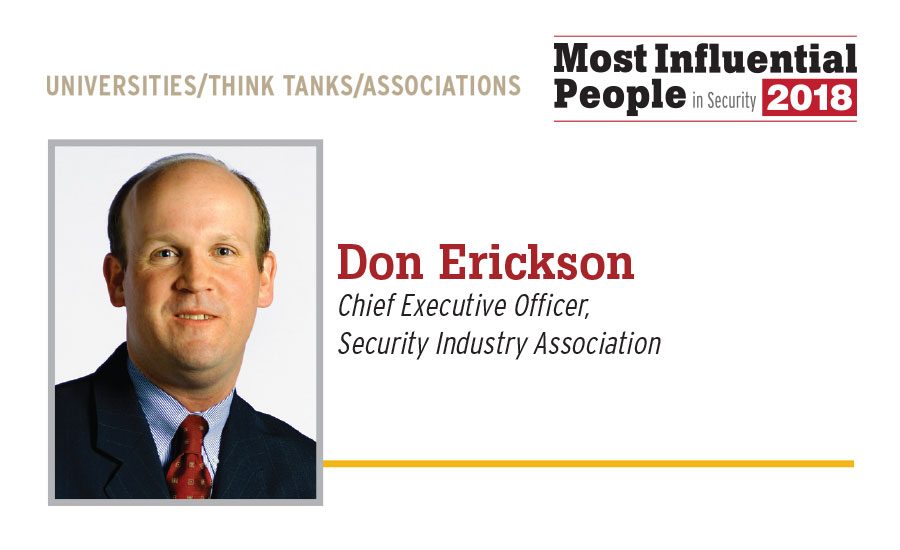Security magazine is pleased to announce our 2018 Most Influential People in Security – 17 top security executives and industry leaders who are positively impacting the security field, their organization, their colleagues and peers, and the national and global security landscape.
These security leaders have been nominated by their colleagues and associates, and were chosen based upon their leadership qualities and overall positive impact on stakeholders, enterprises, colleagues, constituents and the general public.
This year’s Most Influential is organized by three categories: Corporate Security Executives; Government and NGOs; and Universities, Think Tanks and Associations.
Here you will find brief overviews of each honoree’s career path, goals and accomplishments – often across both the public and private sectors – as well as advice for those security professionals looking to follow in their footsteps, including being a security generalist, investing in lifelong education, seeking mentors and more.
Our special appreciation goes to Jerry Brennan, who was a project partner on this report and provided subject matter expertise and research.
For a listing of past Most Influential People in Security honorees, please visit: https://www.securitymagazine.com/Most-Influential-People-in-Security-Industry
List Overview (continued):
Aflalo | Beighley | Christie | Foynes | Green | Kimmins | Lanier | Medeiros | Sawyer | Seger | Government & NGOs | Universities, Think Tanks & Associations
Corporate Security Executives

David Aflalo
Senior Vice President,Corporate Security
General Motors Financial Company
David Aflalo, CPP, serves as GM Financial’s senior security executive and is responsible for the development, implementation and oversight of its corporate security strategy, programs and operations enterprise-wide. Aflalo is a board-certified security management professional with a career spanning over 35 years, including senior leadership roles in the public and private sectors. He is a retired Connecticut State Police commander, and served as Director of Facility Security for ESPN and Director of Regional Security Operations for Capital One before joining GM Financial in 2015.
GM Financial is a global provider of auto finance solutions with operations in the U.S., Canada, China and Latin America. Under Aflalo’s leadership, the GM Financial security model has evolved into a holistic, effective and integrated program aligned with the company’s risks.
The convergence of this program and a culture of heightened security awareness at GM Financial has yielded a more secure workplace environment. “This could not have been accomplished without the dedicated and skilled efforts of a team of security professionals, committed to promoting security and safety at GM Financial,” Aflalo says. Aflalo is actively engaged in industry efforts focused on the professional development of next-generation security leaders.
“Probably the most helpful career advice that I can offer future security professionals would be to remain well-attuned to the ever-evolving threat landscape,” Aflalo says. “The rate of technological change within the world today has accelerated exponentially from even a decade ago, and the volatility of emerging threat environments presents new risks that require new security solutions and countermeasures.”
Aflalo is a member of the ASIS Banking and Financial Services Council and the ASIS CSO Center for Leadership & Development and served as the Chair of the Center’s Mentoring Committee. He is an active member of the International Security Management Association (ISMA), the International Association of Chiefs of Police (IACP) and the Association of Threat Assessment Professionals (ATAP).

Jay Beighley
Associate Vice President, Corporate Security,
Nationwide Mutual Insurance Corp
Jay C. Beighley, CPP, is the Associate Vice President of Corporate Security for Nationwide Mutual Insurance Company. In his role, he developed an enterprise approach to manager proprietary and contract security officers, associate awareness and training and policy development across Nationwide’s 300 locations.
Beighley authored a security officer and investigator accreditation program with the State of Ohio to validate quality, assure compliance and provide a measuring stick for the public to use when hiring or evaluating security services. The standard, developed with a partnership with the Private Investigator and Security Standards Commission and the International Foundation of Protection Officers (IFPO), comprises a total of 26 standards, but companies start with six: roles and authority, use of force, recruitment, performance evaluations, critical policies and company records.
“This is something the industry desperately needs,” says Beighley. “We need a benchmark to identify professional service for those who employ us and to help elevate the level of expectation for the quality of our services… The public needs to know who they are dealing with; they should be able to demand a higher level of quality, and there needs to be a differentiator between good and bad security services.”
Prior to his work at Nationwide, Beighley was State Security Director for the State of Ohio, where he authored the Ohio School Security Standards and developed a workplace violence prevention and intervention program. He has also served as Director of Security for footwear retailer Shonac/DSW, and as a 2nd Lieutenant in the Ohio Military Reserve. He is a member of the Council of Global Security Executives and a member of the FBI Domestic Security Alliance Council (DSAC).
Executives and a member of the FBI Domestic Security Alliance Council (DSAC). Having worked in both the private and public sectors, Beighley says that remaining flexible is key to a long security career. “Each sector can teach you things about being a leader, and leadership skills are transferable to any position… It’s hardly ever a straight line to the CSO’s office, so remain open to new opportunities that fill voids in your experience and that provide you opportunities to grow as a leader.”
Beighley has written three books about security: “Workplace Violence: Identify, Act, and Resolve” (1998), “School Violence Prevention: Proactive Intervention, Peaceful Resolution” (1999), and “War in the Workplace” (2016).

Buffy Christie
Director of Global Security,
Novelis
Buffy A. Christie, CFE, is the Director of Global Security for Novelis, Inc., an industrial aluminum company. During her tenure at Novelis, Christie is focused on designing and building a global security program that encompasses standards, training, duty of care and a global crisis management program. Her role covers all aspects of physical security, personnel security, information protection, crisis management, executive protection, investigations and security administration.
Christie is actively involved in a number of industry associations and groups, including the International Association of Financial Crimes (Board of Directors); International Association of Financial Crimes Investigator, Southeastern Chapter (President); and the High Technology Crime Investigations Association (Treasurer), among others. Christie credits networking and building a diverse, global group of individuals who can help solve problems as one of her most diligent ongoing endeavors.
“If you want to be in security or law enforcement,” she says, “then find ways to not only learn through education (school, classes and certification), but also seek industry groups to gain firsthand insights, volunteer for programs that support your goals, and find a company or organization where you can learn and grow. The security industry is one of the fastest moving, demanding and ever-changing groups that has a meaningful impact for others. You must be passionate and love the challenge of teaching others about security… and watching an organization grow and change.”
Prior to her work at Novelis, Christie worked for Equifax, Inc., as the Senior Director of Global Investigations and Credentialing, and as a Fraud Prevention & Investigations Team Leader at JPMorgan Chase, where she prevented $18 million of fraudulent transactions by creating and executing a fraud preventions strategy.
Christie has a Bachelor of Science degree in Criminal Justice from American Intercontinental University in Atlanta. She is a frequent speaker about the value of security and enjoys teaching others to want to implement stronger security measures.

Michael Foynes
Senior Director, Global Security Operations,
Microsoft
Michael Foynes is the Senior Director of Global Security Operations for Microsoft, and he is responsible for the enterprise’s physical security operations and its strategic development of teams, programs and operating models.
In his current role, Foynes is leading an enterprise-wide initiative called Project Falcon, which will involve building an intelligent platform that enables cyber at the edge and leverages data insights to enrich the employee experience, enhance life safety management and optimize operations. The shift will include a dynamic access management platform, a robust threat detection program within the Virtual Security Operations Center (VSOC), and a lean, agile, liquid workforce model, creating a smart, secure and scalable security environment.
“This transformation will disrupt physical security and make traditional threat detection and security risk management obsolete,” Foynes says. The project is expected to save Microsoft more than $500 million over the next 10 years via reduced infrastructure deployments.
Prior to joining Microsoft in 2003, Foynes worked in a variety of roles around the world, providing strategic corporate consultancy, advice and support. He holds a Master’s degree in Risk, Crisis and Disaster Management, and is currently on the Board of Directors for the Security Industry Association (SIA). He is an elected Fellow of The Security Institute.
Foynes was a member of the United Nations Interregional Crime & Justice Research Institute (UNICRI) Public-Private Partnership Working Group to “Protect Vulnerable Targets from Terrorist Attack,” which resulted in the publication of a UNICRI Handbook in 2010.
Regarding up and coming security professionals, Foynes says: “The security industry is in the midst of a huge digital disruption. Traditional security functions, roles and responsibilities are converging around data-enabled solutions and digital capabilities. The next generation of security leaders will be required to apply digital constructs across all their business processes and programs. Cloud computing, Artificial Intelligence and Machine Learning with Edge IOT are blurring the lines between logical and physical environments. Traditional security mindsets will not prevail in a digital business. (Security leaders) will need to embrace a digital mindset.
“The security professionals of the future will need different skillsets and toolkits. Business degrees and technical degrees in computer science, cyber and digital business will be foundational. Moreover, for digital leaders to be successful in the future, they need to embrace disruption, instill a digital culture and develop services leveraging intelligent cloud and intelligent edge. Digital security leaders have an incredible opportunity to lead this transformation. This is the decade of opportunity for the right leaders.”

Ron Green
Executive Vice President & Chief Security Officer,
Mastercard
Ron Green is Executive Vice President and CSO for Mastercard, leading a global team to ensure the safety and security of the Mastercard network, internal and external products and services, 18,000 employees and dozens of offices worldwide. Green is responsible for Mastercard's Corporate Security team, which oversees physical and cyber security engineering, security event management and incident response, as well as cryptographic key management, business continuity, disaster recovery and emergency management.
This year, Green and his team reimagined how Mastercard addresses phishing and spam attempts by implementing a quarterly phishing “tournament,” using prizes to encourage employees to actively search for and report social engineering emails, which helps to supplement existing security programs and improves employee security awareness and involvement.
Prior to joining Mastercard in 2014, Green served as Deputy CISO at Fidelity Information Services; Director, Investigation and Protections Operations at Blackberry; and Senior Vice President across several areas at Bank of America. He has served as a special agent in the U.S. Secret Service and as a U.S. Army officer. Within the Secret Service, he was one of the first agents to receive formal training on seizing and analyzing electronic evidence and worked on a number of international cyber-crime investigations.
Green is a recent graduate of the FBI’s CISO and Domestic Security Executive Academies, and he holds a Bachelor’s degree in mechanical engineering from the United States Military Academy at West Point and holds a graduate certification in Information Assurance from George Washington University.
He is a member of the European Cyber Resiliency Board and an executive committee member for the Financial Services Sector Coordination Council, and serves on the Financial Services Information Sharing and Analysis Center (FS-ISAC) and Overseas Security Advisory Council (OSAC).
Green advises future security professionals to be persistent and to avoid complacency. “What you understand today isn’t how it will work tomorrow,” he says. “Once upon a time, we in security believed if we could put firewalls in place, it would protect us from everything. Then we began installing anti-virus software to increase that protection. The fact is: the threat actors are always upping their game. It’s important not only to focus on the current threats, but to look ahead and anticipate future threats.”

David Kimmins
Chief Security Officer,
Aptiv
David Kimmins is the Chief Security Officer for Aptiv, formerly Delphi Automotive PLC, where he leads a global team of security professionals responsible for a wide range of risk control disciplines, including investigations, physical security, security technology, contract guard force management, supply chain security, executive security, brand protection, fire protection and fire life safety.
He is the Chair of the DHS Critical Manufacturing Sector Coordinating Council (SCC), where he supports cooperation between the public and the private sectors.
Past positions include the CSO and Senior Director, Global Safety, Security and Asset Protection for Starwood Hotels and Resorts Worldwide, Inc., and the International Risk Control Director for Walmart Stores, Inc. During his tenure at Starwood, Kimmins was a founding member of the Hotel Security Working Group (HSWG), a collaborative public-private partnership between the U.S. Department of Homeland Security and major U.S.-based global hotel chains. He also served as the Lodging & Hospitality Chair of the DHS Commercial Facilities Sector Coordinating Council, and he is a long-time member of the Overseas Security Advisory Council (OSAC).
Kimmins is an advocate of “servant leadership,” which means “empowering your team, backing them up in their decision-making and giving them the support to execute on those decisions.”
He also recommends being a “generalist” within the security field. “By their very nature, security departments – even in big companies – are small, so team members may be called upon to undertake an investigation, carry out a site physical security assessment, organize a guarding contract, participate in an executive security mission and many other tasks. I have been fortunate enough in my career to have gained experience in a number of risk control disciplines including security, safety, fire protection, fire life safety, environmental management and even food safety. Branch out; if you have an opportunity to become a risk generalist, take it. There should be a strong nexus amongst the risk control disciplines.”
Kimmins has a Bachelor of Science degree in Environmental Management & Technology from the University of Sunderland in England and a Master of Science degree in Process Manufacturing Management from the University of Teesside in England.
Cathy Lanier
Senior Vice President of Security,
National Football League
Cathy Lanier is the Senior Vice President of Security for the National Football League (NFL), where she is leveraging close ties with law enforcement agencies and internal stakeholders to promote information-sharing and collaboration between guest services, team security directors and stadium or venue security leaders. Previously, Lanier spent nearly 27 years with the Metropolitan Police Department in Washington, DC, climbing the ranks from uniform patrol all the way to becoming Chief of Police.
After 9/11, Lanier was named Commander of the Special Operations Division (SOD), where she managed the Emergency Response Team, Aviation and Harbor Units, the Joint Terrorism Task Force and the Civil Disturbance Units, among others. During her tenure as SOD Commander, she established the agency’s first Homeland Security/Counter-Terrorism Branch and created an agency-wide chemical, biological, radiological response unit – the Special Threat Action Team.
In 2006, Lanier was tapped to lead the MPD’s Office of Homeland Security and Counter-Terrorism, and in 2007, she was unanimously confirmed as the Chief of Police by the Council of the District of Columbia – becoming the first woman to hold that rank in the Department’s history. During her 10 years in that role, she transitioned the department from a paper agency to one of the most technologically advanced police departments in the country, integrating more than a dozen technologies to create one of the most effective crime prevention/crime response networks in the nation.
“There is no greater feeling than improving safety for our police officers and the community,” Lanier says. Lanier is a graduate of the FBI National Academy and the Federal Drug Enforcement Administration’s Drug Unit Commanders Academy. She holds Bachelor’s and Master’s degrees in Management from Johns Hopkins University, and a Master’s Degree in National Security Studies from the Naval Postgraduate School.
“Formal education is a very important part of your career development and opens doors for you throughout your lifetime,” Lanier says. “However, don’t overlook continuing education after you have obtained your degrees. In the security field, the threats and tools of the trade are constantly changing, and you must stay on top of them. The speed with which technology is changing is difficult to stay up on, but you must keep pace to be effective.”

Stephen Medeiros
Chief of Campus Police & Security,
HealthFirst Family Care Center
Stephen P. Medeiros is the Chief of Campus Police & Security for the HealthFirst Family Care Center in Fall River, Massachusetts. After accepting the newly created position in 2012, Chief Medeiros began to make changes that would impact not only his department and his enterprise, but his community.
When he arrived on campus, Chief Medeiros designed a comprehensive annual training and recertification program. He cultivated a strong working relationship with local law enforcement, regularly sharing security video and resources when needed.
Chief Medeiros is responsible for managing the daily operation of the community medical center campus police and security program, including budget development, regulatory oversight and emergency management. He frequently undertakes training programs (such as FEMA Healthcare Leadership in Mass Casualty Event Training and the National Rifle Association Refuse To Be A Victim certification) so he can bring back lessons-learned to apply to the healthcare campus as well as to use in instructing and mentoring security officers.
Chief Medeiros is also striving to address patients’ and visitors’ relationship with security. In 2017, the HealthFirst Campus Police & Security Department hosted its first Coffee with a Cop event for visitors, neighbors and patients, and Chief Medeiros created the HealthFirst Junior Police Officer Program so campus security personnel can interact with children visiting the facility, helping to change stereotypes that young children may have regarding public safety officers.
In a 2016 company-wide survey grading the effectiveness of the HealthFirst security department – measuring employee confidence in the department, leadership of the department, visibility, response time and quality of outcome, appearance, innovation and professionalism – the department scored in the 97th percentile for all categories at the highest level.
“I am most proud of the men and women that I have had the privilege to supervise and mentor,” says Medeiros. “I have been fortunate to see many of these security/law enforcement professionals go on to positions of increased responsibility and become outstanding supervisors and mentors in their own right.”
Earlier in his career, Chief Medeiros served as a police officer for the City of Fall River and for the Town of Piermont in New Hampshire.

Jim Sawyer
Director of Security Services,
Seattle Children’s Hospital
Jim Sawyer, CPP, CHPA, is the Director of Security Services for Seattle Children’s Hospital, where he emphasizes a philosophy of “zero incidents,” not “zero tolerance.”
Sawyer, who has been part of the Seattle Children’s security team since 1976, is responsible for planning, implementing and evaluating the hospital’s overall security strategy and related plans to ensure a safe and secure environment for patients, families, visitors and employees. Sawyer collaborates with local law enforcement and fire officials, as well as other departments’ management to ensure everyone is on the same page when striving to meet security needs.
Sawyer actively participates on the hospital safety committee and provides advice and assistance with activities such as employee safety, infection control, disaster response planning, code DELTA and other incidents.
In addition, Sawyer develops and delivers quarterly safety programs and various safety programs to address specific department needs and organizational needs.
Sawyer is the current President and a crime prevention instructor with the Washington State Crime Prevention Association (WSCPA), the Crisis Prevention Institute (CPI) and the American Board of Certification for Homeland Security, and he serves as an instructor and consultant for assault prevention and verbal de-escalation training sessions for schools, institutions and organizations.
In Seattle Children’s, a 250-bed hospital regularly ranked highly as one of the top children’s hospitals in America by U.S. News & World Report, Sawyer and his team of security officers use de-escalation tactics (such as “restatement for clarification”) to address potentially risky interactions with patients or visitors, which helps to reduce workplace violence incidents.
He is a member of ASIS International, ABCHA, CPI, WSCPA, IAHSS and the National Association of Chiefs of Police. Sawyer says he is most proud of “managing an exceptionally decent and dedicated team of security professionals” and “building a program that emphasizes optimum customer service as one’s finest violence prevention strategy.”
Sawyer has a Bachelor’s degree in Society and Justice from the University of Washington.

Mike Seger
Director of Safety and Student Services,
Penn-Harris-Madison School Corporation
Mike Seger is the Director of Safety and Student Services for the Penn-Harris-Madison School Corporation in Mishawaka, Indiana, which includes 15 schools and serves more than 11,300 students.
Seger has initiated a three-layer approach to school safety and security – the layers being securing perimeter and entrance areas, locking off learning environments, and securing classrooms – that has become a key benchmark for Indiana schools. This layered approach has directly impacted school safety and improved the self-actualization of students and staff. Graduation rates at Penn High School improved from 79 percent in 2007 to 97 percent in 2017.
“In a safe environment, students can achieve academic excellence,” Seger says. “These initiatives provided a sense of relief, comfort and protection to our teachers, students and community while establishing a safe and secure environment.”
The safety and security layers have been identified as best practices by the Indiana Department of Education. Seger is a regular participant in training and education initiatives, conducting tabletop exercises to encourage education and awareness and initiating active shooter training opportunities for staff, students and community members. He has presented at the National School Boards Association, Indiana School Boards Association, Michigan Association of School Business Officials, Indiana School Safety Academy and on a local level to enhance the knowledge and commitment toward providing a safe and secure environment for K-12 students. He served on a committee to evaluate the Safe School’s Initiative Study with the U.S. Department of Education and facilitated regional training for the Indiana Department of Education to promote school security.
Seger serves as the chairperson for the St. Joseph County Safe School’s Commission and is a member of the Indiana Association of School Business Officials. He holds a Bachelor’s degree in Criminal Justice and Security Management from the University of Evansville.
Says Seger: “The culmination of your knowledge and experience can assist in building a culture of safety within your own school community.”
